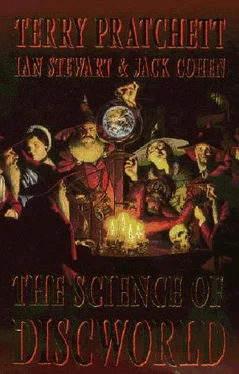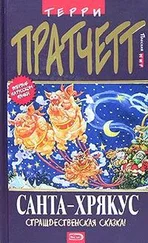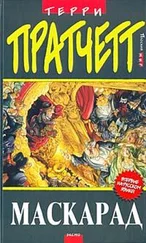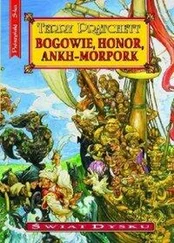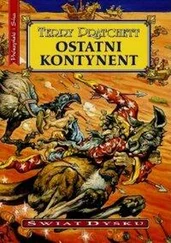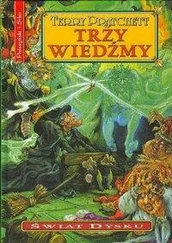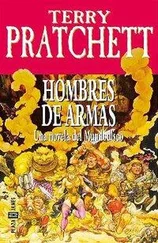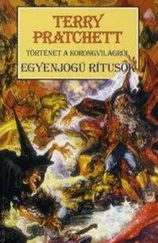Terry Pratchett - Science of Discworld
Здесь есть возможность читать онлайн «Terry Pratchett - Science of Discworld» весь текст электронной книги совершенно бесплатно (целиком полную версию без сокращений). В некоторых случаях можно слушать аудио, скачать через торрент в формате fb2 и присутствует краткое содержание. Жанр: Фантастика и фэнтези, на английском языке. Описание произведения, (предисловие) а так же отзывы посетителей доступны на портале библиотеки ЛибКат.
- Название:Science of Discworld
- Автор:
- Жанр:
- Год:неизвестен
- ISBN:нет данных
- Рейтинг книги:4 / 5. Голосов: 1
-
Избранное:Добавить в избранное
- Отзывы:
-
Ваша оценка:
- 80
- 1
- 2
- 3
- 4
- 5
Science of Discworld: краткое содержание, описание и аннотация
Предлагаем к чтению аннотацию, описание, краткое содержание или предисловие (зависит от того, что написал сам автор книги «Science of Discworld»). Если вы не нашли необходимую информацию о книге — напишите в комментариях, мы постараемся отыскать её.
Science of Discworld — читать онлайн бесплатно полную книгу (весь текст) целиком
Ниже представлен текст книги, разбитый по страницам. Система сохранения места последней прочитанной страницы, позволяет с удобством читать онлайн бесплатно книгу «Science of Discworld», без необходимости каждый раз заново искать на чём Вы остановились. Поставьте закладку, и сможете в любой момент перейти на страницу, на которой закончили чтение.
Интервал:
Закладка:
So it is with the fighter pilots. The curious figures that drew researchers' attention to these particular effects may well have been the result of selective reporting, or selective attention. If so, then we can make a simple prediction: 'From now on, the figures will revert to fifty-fifty.' If this prediction fails, and if the results instead confirm the bias that revealed the clump, then the new data can be considered significant, and a significance level can sensibly be assigned by the usual methods. But the smart money is on a fifty-fifty split.
The alleged decline in the human sperm count may be an example of selective reporting. The story, widely repeated in the press, is that over the past 50 years the human sperm count for 'normal' men has halved. We don't mean selective reporting by the people who published the first evidence, they took pains to avoid all the sources of bias that they could think of. The 'selective reporting' was done by researchers who had contrary evidence but didn't publish it because they thought it must be wrong, by journal referees who accepted papers that confirmed a decline more often than they accepted those that didn't, and by the press, who strung together a whole pile of sex-related defects in various parts of the animal kingdom into a single seamless story, unaware that each individual instance has an entirely reasonable explanation that has nothing to do with falling sperm-counts and often nothing to do with sex.
Sexual abnormalities in fish near sewer outlets, for instance, are probably due to excess nitrites, which all fish-breeders know cause abnormalities of all kinds, and not to oestrogen-like compounds in the water, which would bolster the 'sperm count' story. Current data from fertility clinics, by the way, show no signs of a decline.
Humans add narrativium to their world. They insist in interpreting the universe as if it's telling a story. This leads them to focus on facts that fit the story, while ignoring those that don't. But we mustn't let the coincidence, the clump, choose the sample space -when we do that, we're ignoring the surrounding space of near-coincidences.
Jack and Ian managed to test this theory on a trip to Sweden. On the plane, Jack predicted that a coincidence would happen at Stockholm airport, for reasons of selective reporting. If they looked hard enough, they'd find one. They got to the bus stop outside the terminal, and no coincidences had occurred. But they couldn't find the right bus, so Jack went back to the enquiries desk. As he waited, someone came up next to him, Stefano, a mathematician who normally occupied the office next door to Jack's. Prediction confirmed. But what was really needed was evidence of a near-coincidence, one that hadn't happened, but could have been selectively reported if it had. For instance, if some other acquaintance had shown up at exactly the same time, but on the wrong day, or at the wrong airport, they'd never have noticed. Near coincidences, by definition, are hard to observe ... but not impossible. Ianhappened to mention all of the above to his friend Ted, who was visiting soon after. 'Stockholm?' said Ted: 'When?' Iantold him. 'Which hotel?' Iantold him 'Funny, I was staying there one day later than your Had the trip been one day later, the 'coincidental' encounter with Stefano wouldn't have happened, but the one with Ted would.
What we must not do, then, is to look back at past events and find significance in the inevitable few that look odd. That is the way of the pyramidologists and the tea-leaf readers. Every pattern of raindrops on the pavement is unique. We're not saying that if one such patterns happens to spell your name, this is not to be wondered at, but if your name had been written on the pavement in Beijing during the Ming dynasty, at midnight, nobody would have noticed. We should not look at past history when assessing significance: we should look at all the other things that might have happened instead.
Every event is unique. Until we place that event in a category, we can't work out which background to view it against. Until we choose a background, we can't estimate the event's probability. If we consider the sample space of all possible DNA codes, for instance, then we can calculate the probability of a human being having exactly your DNA code, which is vanishingly small. But it would be silly to conclude that it is impossible for you to exist.
STILL BLOODY LIZARDS
'THE FUTURE IS LIZARD,' said Ridcully. 'Obviously.' It was a few days later. The omniscope was focused on a mound of leaves and rotting vegetation a little way from the banks of the river. There was a large depression hanging over the Senior Wrangler, and the Dean had a black eye. The war between land and sea had just entered a terminal stage.
'Little portable seas,' said Ponder. 'You know, I never thought of them like that.'
'An egg is an egg, however you look at it,' said Ridcully. 'Look, you two, I don't want to see a scuffle like that again, d'you hear?' The Senior Wrangler dabbed at his bleeding nose. 'He goaded be,' he said. 'Id's still osuns, howeber you look at id.' 'A private ocean full of food,' said Ponder, still entranced. 'Hidden in a heap of... well, compost. Which heats up. That's like having private sunshine.'
The little lizard-like creatures that had hatched from the eggs in the mound slithered and slid down the bank into the water, bright-eyed and hopeful. The first few were instantly snapped up by a large male lying in wait among the weeds.
'However, the mothers still have something to learn about postnatal care,' said Ridcully. 'I wonder if they'll have time to learn? And how did they know how to do this? Who's telling them?'
The wizards were depressed again. Most days started that way now. Creatures seemed to turn up in the world randomly, and certainly not according to any pictures in a book. If things were changing into other things, and no one had seen that happen yet, why were the original things still the original things? If the land was so great, why were any fish left in the sea?
The air-breathing fishes that Rincewind had seen still seemed to be around, lurking in swamps and muddy beaches. Things changed, but still stayed the same.
And if there was any truth at all in Ponder's tentative theory that things did change into other things, it led to the depressing thought that, well, the world was filling up with quitters, creatures which -instead of staying where they were, and really making a go of life in the ocean or the swamp or wherever, were running away to lurk in some niche and grow legs. The kind offish that'd come out of water was, frankly, a disgrace to the species. It kept coughing all the time, like someone who'd just given up smoking.
And there was no purpose, Ridcully kept saying. Life was on land. According to the book, there should be some big lizards. But nothing seemed to be making much of an effort. The moment anything felt safe, it stopped bothering.
Rincewind, currently relaxing on a rock, rather liked it. There were large animals snuffling around in the greenery near the rock he was sitting on; in general shape and appearance, they looked like a small skinny hippopotamus designed in the dark by a complete amateur. They were hairy. They coughed, too.
Things that were doing sufficiently beetle-like things for him to think of them as beetles ambled across the ground.
Ponder had told him the continents were moving again, so he kept a firm grip on his rock just in case.
Best of all, nothing seemed to be thinking. Rincewind was convinced that no good came of that sort of thing.
The last few weeks of Discworld time had been instructive. The wizards had tentatively identified several dozen embryo civilizations, or at least creatures that seemed to be concerned about more than simply where their next meal was coming from. And where were they now? There was a squid one, HEX said, out in the really deep cold water. Apart from that, ice or fire or both at once came to the thinkers and the stupid alike. There was probably some kind of moral involved.
Читать дальшеИнтервал:
Закладка:
Похожие книги на «Science of Discworld»
Представляем Вашему вниманию похожие книги на «Science of Discworld» списком для выбора. Мы отобрали схожую по названию и смыслу литературу в надежде предоставить читателям больше вариантов отыскать новые, интересные, ещё непрочитанные произведения.
Обсуждение, отзывы о книге «Science of Discworld» и просто собственные мнения читателей. Оставьте ваши комментарии, напишите, что Вы думаете о произведении, его смысле или главных героях. Укажите что конкретно понравилось, а что нет, и почему Вы так считаете.
